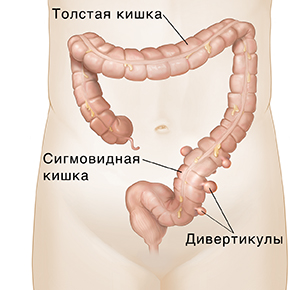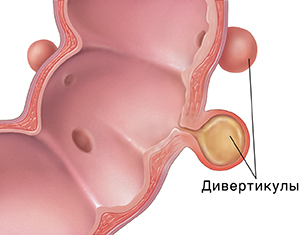Понятие дивертикулез и дивертикулит
Толстая кишка (толстый кишечник) является последней частью пищеварительного тракта. Он поглощает воду из стула и превращает его из жидкости в твердое вещество. У некоторых людей в стенках толстой кишки могут образовываться небольшие мешочки, называемые дивертикулами. Это называется дивертикулез. Оно очень распространено у пожилых людей. Эти мешочки могут воспаляться и инфицироваться. Заболевание становится более серьезной проблемой, называемой дивертикулитом. Эти проблемы могут быть болезненными. Но ими можно управлять — лечить их.


Управление вашим состоянием
Врач может порекомендовать сменить диету или заменить принимаемые лекарства. В тяжелых случаях может быть необходима хирургическая операция.
Определенные лекарства помогают размягчать и увеличивать стул в объеме, что облегчает опорожнение кишечника. Эти препараты выпускаются в форме таблеток, порошка и капсул:
- Псиллиум
- Метилцеллюлоза
- Поликарбофил
Если у вас дивертикулез
Следуйте данным рекомендациям по лечению:
-
Внесите изменения в питание. Зачастую таких мер достаточно для контроля симптомов. В основном требуется увеличить количество клетчатки и употреблять больше воды. Волокно поглощает воду при прохождении через толстую кишку. Это помогает вашему стулу оставаться мягким и продвигаться плавно. В таких случаях помогает вода.
-
При необходимости вам могут предложить принимать безрецептурные смягчители стула.
-
Чтобы облегчить боль, принимайте спазмолитические препараты в соответствии с назначением.
-
Следите за изменениями в вашем кишечнике. Сообщите своему врачу, если заметите какие-либо изменения.
-
Начните программу физических упражнений. Спросите у врача, с чего следует начать.
-
Побольше отдыхайте и спите.
Если у вас дивертикулит
Лечение зависит от того, насколько тяжелы ваши симптомы. Симптомы:
-
При слабых симптомах. На короткое время вам могут прописать жидкую диету. Вам могут назначить антибиотики. Если данные назначения облегчат симптомы, вам могут назначить диету с высоким содержанием клетчатки. Если симптомы не проходят, врач обсудит с вами другие варианты лечения.
-
При сильно выраженных симптомах. Возможно, вам придется лечь в больницу. Вам могут назначить внутривенное введение антибиотиков и жидкостей. Вам придется придерживаться диеты с низким содержанием клетчатки или жидкой диеты. Операция может потребоваться, если сильно выраженные симптомы не снимаются медикаментозным лечением или если дивертикул лопнул (разорвался).
Ключи к здоровью толстой кишки
Сохранить вашу толстую кишку в здоровом состоянии можно, соблюдая следующие рекомендации:
- Ешьте здоровую пищу. Диета должна включать большое количество фруктов, овощей и цельного зерна с высоким содержанием клетчатки.
- Пейте много жидкости, например, воды и сока.
- Ведите здоровый образ жизни. Регулярно выполняйте физические упражнения, управляйте стрессом, хорошо отдыхайте и высыпайтесь.